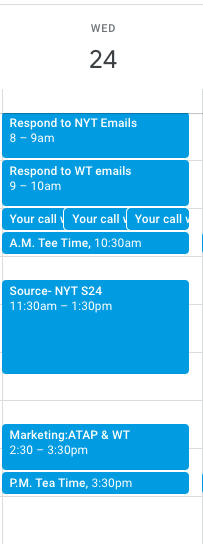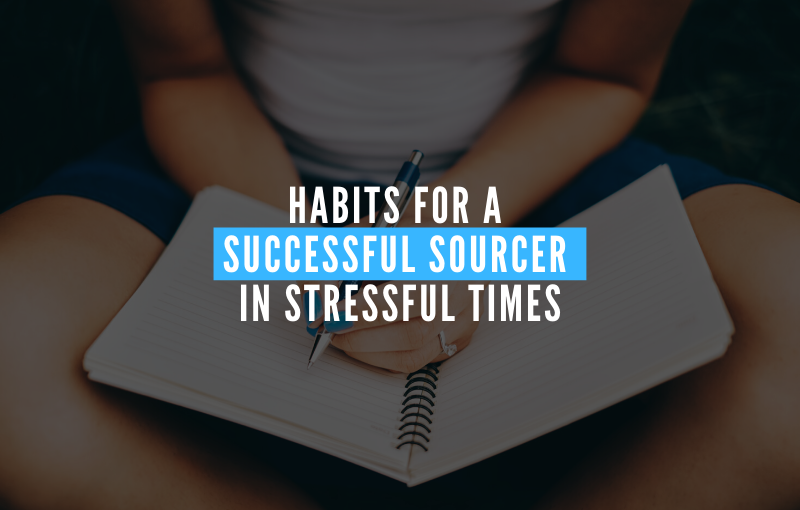Habits for a Successful Sourcer in Stressful Times
Providing high-quality work in times that you are dealing with high-stress levels can be challenging. However, there are several steps you can take to reduce any additional stress and ensure a successful work week. Here are some tips that I have found useful over the past few months to help me deliver my work on time and at a high quality.
Time Management
Set yourself up for success by aggregating a to-do list for your upcoming week ahead of time. Personally, I use Todoist to stay on top of all of my tasks that I need to address. I also like to keep track of my whole calendar year in an Erin Condren planner. The planner is highly customizable, and can even break down your time by the hour.
Using a time management tool will allow you to see what you need to accomplish and estimate how much time each task will take. If you are prepared with knowing your workload, you can better plan out time blocking.
Allowing yourself longer periods of time blocks throughout your day to solely dedicate to one task can help with focus and productivity. Here’s an example of how I personally time block:

I am always sure to allow myself extra unscheduled time each day for any last-minute tasks or to-dos that may arise at the last minute. Making sure you have your schedule planned out can reduce any additional stress by a visualization of how you will be successful that week. It will also ensure that you are not leaving any tasks unaddressed.
Avoiding Shortcuts
When pressed for time, it may seem like the best strategy to take a “time saving” shortcut. I recently made the mistake of taking this route. I ran several title searches for a Software Engineer search that combined any standard SWE title. It looked like this:
cur_title:((software OR swe OR java OR golang) AND (engineer* AND develop* OR swe)) NOT cur_title:(devops OR test OR qa OR quality OR sdet OR intern OR manag* OR vp OR direct*)
While I figured that running a title string would save me time by pulling up candidates that have the title I’m looking for, I ended up costing myself time. I pulled back several profiles that had little to no data regarding the must-have skill sets that I was looking for.
Because I was guessing that a title string would pull up the right candidates, I was gambling with my time. Instead, I could have done research quickly to help me understand the must-have skills and how people talk about those skills to run a strong search that would have pulled up the correct profiles.
Sticking to strategies that you have seen lead to success in the past is a safer bet in a time that you may be particularly stressed or in a time crunch.
Use of Spreadsheets
Since starting with Wayne Tech, I have taken on the role of our internal head of Marketing as well as a volunteer marketing position with the Association of Talent Acquisition Professionals. Because I am a heavy spreadsheet user for sourcing data, I resorted to spreadsheets to also collect any marketing data that I would need to keep myself organized.
Creating a spreadsheet to track which articles I’ve posted, when I wrote posts, and the content of each post was time-consuming up front, but has saved me countless hours since. If I need to create a post quickly, I can refer to my tab on which articles have/have not been posted and choose what makes sense for that week. And, if I do have extra free time during the week, I can plan out my following week’s posts on my tab tracking the data on each post.
While I am a fan of spreadsheets, there are other tools out there to provide data aggregation and organization.
Take Away
Staying organized can prepare a sourcer for an unexpectedly stressful week. Taking time during a low volume week to plan out your organization strategy will help reduce any additional stress that you may face in the future.

Investing time in organizing will help you to avoid feeling like Dwight during particularly stressful times.
Authors
Julia Adler
Julia "Wonder Woman" Adler Sourcer Julia Adler is currently working as a Sourcer at Wayne Technologies. She works based on clear deliverables, provide full-cycle transparent data, and are changing the way our clients view sourcing. On a day to day basis, she sources candidates, delivers talent maps and market data, finds emails, uses/has experience with a wide variety of tools, and contacts candidates with messaging built around the DISC personality profiles. Outside of Wayne Tech, Julia volunteers as the Editor of ATAP (Association of Talent Acquisition Professionals), is a Staff Writer for SourceCon, and was a Speaker at SourceCon 2020. In her free time, you can find her on a run with her pup, painting, or listening to podcasts. She has been working in recruiting/sourcing for the past four years and specializes in recruitment tooling, building boolean strings, natural language search, and raw sourcing. She believes that you are never done learning, regardless of where you are in your career.
Recruit Smarter
Weekly news and industry insights delivered straight to your inbox.





